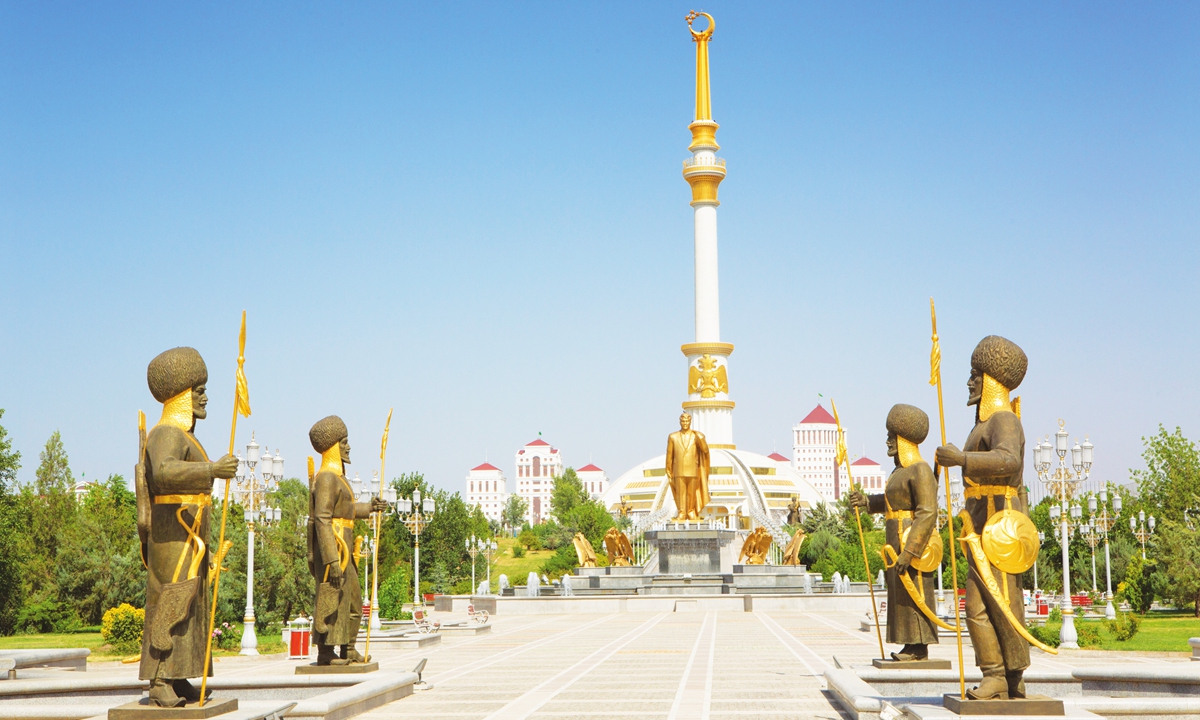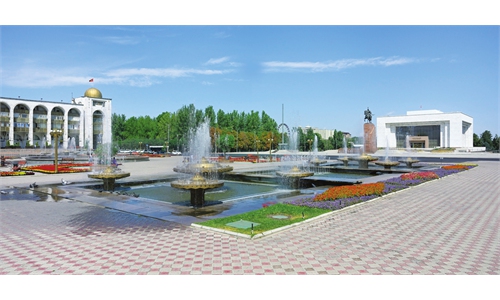
A view of the independence monument in Ashgabat, capital of Turkmenistan. Photo: VCG
Editor's Note:
The past year, 2023, was a busy one for China in terms of its interactions with the rest of the world. Its foreign relations always have a profound impact on its economy, strategy and people's livelihoods. The Global Times, in collaboration with China's prestigious universities and think tanks, is now releasing a series of country reports. The aim of these reports is to enhance understanding of relevant countries, provide a framework for dealing with China's relations with these countries and grasp the trajectory of these relations.
In the fifth report of the series, we focus on Turkmenistan, a country located in Central Asia.
Since China's proposal of the Belt and Road Initiative (BRI) one decade ago, the strategic partnership between China and Turkmenistan has continuously developed, and bilateral cooperation has achieved multiple results. In particular, the cooperation between the two countries in the energy sector is in line with the strategic interests of both sides and has become an important direction for bilateral cooperation. China should comprehensively analyze the development process of its cooperation with Turkmenistan, summarize achievements and experiences, comprehensively assess the trend of cooperation, and help upgrade the quality of bilateral cooperation.
Fruitful achievements
Since the establishment of diplomatic relations in 1992, China-Turkmenistan relations have witnessed leapfrog development. Over 30 years ago, China was the first country to establish diplomatic relations with Turkmenistan. It is the country of the first batches to support Turkmenistan's policy of permanent neutrality, the first strategic partner established through a political document, and the largest natural gas trading partner of Turkmenistan. When Chinese President Xi Jinping paid a state visit to Turkmenistan in September 2013, the two countries established a strategic partnership.
In May 2014, then-Turkmen president Gurbanguly Berdimuhamedov paid a state visit to China, and the two sides signed the Treaty of Friendship and Cooperation. In January 2023, President Serdar Berdimuhamedov paid a state visit to China and met with President Xi. During this event, the two presidents announced the decision to elevate the China-Turkmenistan relationship to a comprehensive strategic partnership. The leaders of the two countries met again during the China-Central Asia Summit in May 2023.
The strategic partnership of the two countries is highlighted in the field of energy cooperation. Turkmenistan has abundant petroleum reserves and ranks fourth in the world in terms of natural gas reserves. The cooperation between the two countries in the natural gas sector is forming a comprehensive pattern of integrating production, pipeline transportation, trade, finance and engineering services, setting an example for the construction of the BRI. China and Turkmenistan, together with Uzbekistan and Kazakhstan, are jointly building the China-Central Asia natural gas pipeline, taking into account the interests of all countries participating in the energy cooperation, whether they produce, transit, or consume energy. Up to now, Turkmenistan has supplied more than 380 billion cubic meters of natural gas to China over the past decade, with the cumulative value of direct natural gas trade exceeding $72 billion. Natural gas trade revenue has become the core source of foreign exchange income for Turkmenistan.
In recent years, thanks to the rapid development of natural gas cooperation, China has become Turkmenistan's largest trading partner, while Turkmenistan has become China's second-largest trading partner in Central Asia. Both sides actively implement the plan to enhance bilateral economic relations in the fields of digital economy and green development, steadily expanding the scale of trade and mutual investment, promoting trade diversification, and accelerating non-energy sector cooperation between the two countries. Among them, the digital economy sector is an important area of cooperation.
Moreover, connectivity development has become a new sphere for cooperation between China and Turkmenistan. In the implementation of Turkmenistan's development strategy to revive the Silk Road, one of the major goals is to build a modern, integrated transportation and logistics hub, which provides impetus for economic growth. The Central Asian country has invested heavily in the construction and improvement of a large number of transportation infrastructure, including the completion of one international seaport in Turkmenbashi and six modern airports across the country. In Turkmenistan, a railway linking Kazakhstan and Iran was launched in 2014, which provides a direct route to the Persian Gulf. Connecting with freight routes between China and Central Asian and Middle Eastern countries, this railway can accelerate freight speed between China and Western Europe and reduce transportation costs.
In addition, growing people-to-people exchanges have helped promote people-to-people bonds between China and Turkmenistan. China has established friendly relations with five Turkmen provinces and cities. Currently, there are more than 2,000 Turkmen students studying in China. Although China has not yet established a Confucius Institute in Turkmenistan, many universities in the Central Asian country, such as the Institute of International Relations of the Ministry of Foreign Affairs of Turkmenistan, the Magtymguly Turkmen State University, the Dovletmammet Azadi Turkmen National Institute of World Languages as well as the International University for the Humanities and Development offer Chinese language courses. In China, Minzu University of China in Beijing and Beijing Foreign Studies University have set up Russian-Turkmen bilingual majors.
Deepening cooperation under BRI
Turkmenistan's adjustment of its national strategic direction for external cooperation to align with the BRI provides a new historical opportunity for collaboration between China and Turkmenistan.
First, with the changing international political and economic landscape and Turkmenistan's adjustments in geopolitical positioning, the country's economic independence is gradually increasing. Due to historical reasons, Turkmenistan's economy was significantly dependent on Russia. However, in recent years, Western countries have intensified economic sanctions against Russia, leading to a decline in Russia's influence in Central Asian countries. This has further fueled Turkmenistan's willingness to strengthen economic cooperation with other countries.
Second, Turkmenistan has faced a reduction in natural gas exports to the West, prompting the need to find new partners. Turkmenistan is keenly interested in cooperating with China. In addition to China, Russia and Iran are also major gas export destinations for Turkmenistan. However, due to international uncertainties, regional instability and economic challenges in those two countries, Turkmenistan has shifted its focus to exporting more gas to China.
Third, there is a noticeable demand for cooperation with China in Turkmenistan. China's rapid economic growth has generated substantial energy demands. Given Turkmenistan's abundant oil and gas reserves and China's financial strength, the two countries complement each other well.
Against this backdrop, the two countries can strengthen cooperation in the following seven aspects.
First, China and Turkmenistan should strengthen high-level exchanges to consolidate political mutual trust, continuing to support each other on core interests and respecting each other's development paths that align with their respective national conditions. China, remaining a trustworthy friend and partner to Turkmenistan, firmly supports Turkmenistan in safeguarding its national sovereignty, independence and territorial integrity. Both countries should continue to strengthen meetings at various levels, exchange views promptly on bilateral relations and important issues of mutual interest and coordinate positions. They need to make full use of the China-Central Asia heads of state meeting mechanism to implement specific cooperation areas.
Second, China and Turkmenistan should advance the alignment of each country's development strategy. Seizing the opportunities for economic recovery in the post-COVID era, they should fully leverage the coordinating role of the China-Turkmenistan Cooperation Committee, intensifying efforts to align the BRI with Turkmenistan's strategy to revive the Silk Road. A concerted effort should be made to effectively implement the five-year cooperation plan (2021-25) between the two governments, promoting simultaneous progress in various areas of cooperation, and facilitating comprehensive development.
China and Turkmenistan need to take proactive and effective measures to enhance the scale of mutual investment and expedite the establishment of a government-to-government mechanism to strengthen cooperation in production capacity and investment. Bilateral cooperation should be deepened in various areas such as energy exploration, development and deep processing, free trade zone construction, smart city development, infrastructure, satellite communication and agriculture. With Turkmenistan enhancing the cross-border hub status of the Turkmenbashi International Seaport, there is extensive cooperation potential in jointly building infrastructure along the Silk Road connecting Asia and Europe.
Third, China and Turkmenistan should expand oil and gas cooperation. Currently, bilateral cooperation is geographically limited to eastern Turkmenistan and primarily focuses on natural gas cooperation. As Turkmenistan's strategic focus shifts toward its western region, Chinese enterprises should consider investing and participating in oil and gas development in western Turkmenistan close to the Caspian Sea, thereby solidifying China's position in Turkmenistan's energy market.
Furthermore, as Turkmenistan's economy is currently heavily reliant on natural gas exports, a reduction in Chinese purchases during periods of declining gas prices could potentially affect Turkmenistan's economy. China can help Turkmenistan explore plans for diversifying its energy exports and the possibility of the construction of the Turkmenistan-Afghanistan-Pakistan-India natural gas pipeline.
Fourth, China and Turkmenistan should expand practical cooperation in multiple areas, including agriculture and communication technology. They need to vigorously promote cooperation in the field of connectivity, expediting the signing of the bilateral agreement on international road transport. They should also strengthen consultations and negotiations at both government and enterprise levels, improve cooperation mechanisms and establish operational rules.
Fifth, China and Turkmenistan should strengthen cooperation in science, education, culture, and health. They need to accelerate the building of cultural centers in both countries, organize cultural events, and strive to complete the construction of the Luban Workshops in Turkmenistan as early as possible. More provinces and cities from both countries are encouraged to establish friendly relations, expanding sub-national exchanges and cooperation.
They should expand cooperation in healthcare, enhance exchanges in traditional medicine, jointly establish traditional medicine centers in Turkmenistan, and cooperate on the cultivation and processing of medicinal plants as well as traditional medical diagnosis and treatment. In addition, the two countries need to enhance exchanges and cooperation between their youth and think tanks.
Sixth, given that Turkmenistan has not joined the Shanghai Cooperation Organisation (SCO) and therefore has not participated in the SCO's multilateral security cooperation framework, China and Turkmenistan should intensify bilateral security cooperation. Both sides should facilitate the establishment of a unified digital information platform to combat new types of transnational organized crimes in cyberspace, ensuring information security, financial security and biosecurity. The military of the two countries need to continue to strengthen strategic communication, deepen mutual trust, expand cooperation areas and enhance pragmatic exchanges in the fields of delegation visits, personnel training and military technology.
Seventh, China and Turkmenistan should also continue to strengthen international affairs cooperation within the framework of the UN, and exchange views promptly on major international and regional issues and coordinate positions. They also need to attach great importance to the China-Central Asia cooperation mechanism, fully implement the outcomes of the China-Central Asia Summit, and use this important platform to enhance communication and promote cooperation in various fields. China should push Turkmenistan for strengthened cooperation with the SCO and support Turkmenistan's accession to the World Trade Organization as early as possible.
Outlook for 2024
In 2024, China and Turkmenistan will take the high-quality construction of the BRI as the central theme, comprehensively promote the alignment of their development strategies, further deepen cooperation in various fields and continuously enrich the connotation of the comprehensive strategic partnership. Both countries are expected to continue to optimize the trade structure, expand investment, economic and technical cooperation and strengthen cooperation in emerging areas, such as green development and digital economy. The documents signed by the two governments to promote scientific and technical cooperation and transport and logistics cooperation in November 2023 is a milestone for China-Turkmenistan cooperation. Under this cooperation, both sides will not only enhance cooperation in nanotechnology, new materials, natural resource processing, biomedicine, seismology, information and communication, but also promote international exchanges in transportation and take the transportation and logistics cooperation between the two countries to a new level.
Xu Changzhi and Su Chang are research fellows at the Chinese Academy of Social Sciences. Chen Dongjie is deputy director of the Central Asia Research Institute at Shaanxi Normal University. opinion@globaltimes.com.cn



